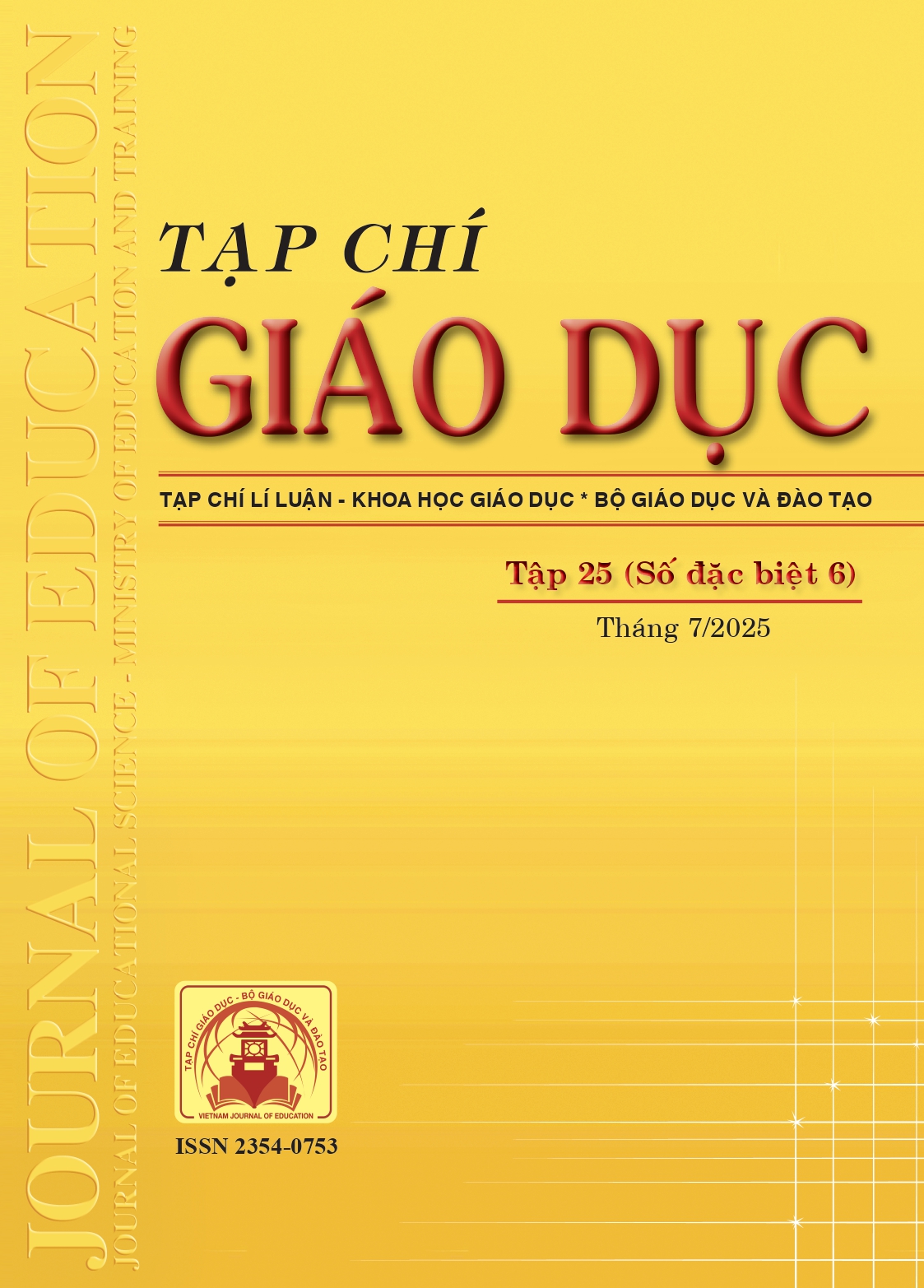Bồi dưỡng kỹ năng siêu nhận thức trong dạy học nội dung “Đường elip trong mặt phẳng tọa độ” (Toán 10) với sự hỗ trợ của phần mềm GeoGebra
Tóm tắt
In the context of modern education emphasizing the development of higherorder thinking skills, metacognitive skills - the ability to monitor, regulate, and manage one's own thinking processes - have gained increasing attention in mathematics instruction. These skills are particularly essential in topics such as the ellipse in the coordinate plane, which require students to flexibly shift between algebraic and geometric representations. This study aims to construct a structured process to foster students’ metacognitive skills through the teaching of ellipses, supported by the dynamic mathematics software GeoGebra as a visualization and thinking tool. A combination of theoretical and analytical research methods was employed to establish a solid scientific and practical foundation for the proposed instructional approach. The findings provide not only a concrete pedagogical guide for mathematics teachers but also valuable theoretical and practical implications for researchers and educational leaders in designing programs that enhance students’ thinking competences. This research contributes to improving the quality of mathematics education, particularly in geometry, by promoting comprehensive cognitive development among learners.
Tài liệu tham khảo
Biryukov, P. (2003). Metacognitive aspects of solving combinatorics problem. Kaye College of Education. http://www.cimt.org.uk/journal/biryukov.pdf
Brown, A. L. (1987). Metacognition, executive control, self-regulation, and other more mysterious mechanisms. In F. E. Weinert & R. H. Kluwe (Eds.), Metacognition, motivation, and understanding (pp. 65-116). Hillsdale, NJ: Lawrence Erlbaum Associates.
Cao Thị Hà, Phí Văn Thủy, Nguyễn Thị Quốc Hòa (2020). Hình thành kĩ năng siêu nhận thức cho học sinh trong dạy học giải tích ở trường trung học phổ thông. Tạp chí Giáo dục, 483, 33-37.
Davidson, J. E., & Sternberg, R. J. (1998). Smart problem solving: How metacognition helps. In Metacognition in educational theory and practice (pp. 47-68). Routledge.
Desoete, A. (2008). Multi-method assessment of metacognitive skills in elementary school children: How you test is what you get. Metacognition and Learning, 3, 189-206.
Flavell, J. H. (1976). Metacognitive aspects of problem solving. In The nature of intelligence (pp. 231-236). Routledge.
Flavell, J. H., & Wellman, H. M. (1975). Metamemory.
Güner, P., & Erbay, H. N. (2021). Metacognitive Skills and Problem-Solving. International Journal of Research in Education and Science, 7(3), 715-734.
Hoàng Xuân Bính (2017). Một số biện pháp sư phạm rèn luyện kĩ năng siêu nhận thức nhằm bồi dưỡng năng lực phát hiện và giải quyết vấn đề cho học sinh trong dạy học hình học không gian ở trường Trung học phổ thông. Tạp chí Khoa học Giáo dục, 147, 68-74.
Hoàng Xuân Bính, Phí Văn Thủy (2021). Rèn luyện kĩ năng siêu nhận thức cho học sinh thông qua việc luyện tập thói quen nhìn lại quá trình giải quyết bài toán. Tạp chí Khoa học Giáo dục Việt Nam, 40, 24-29.
Kipnis, M., & Hofstein, A. V. I. (2008). The inquiry laboratory as a source for development of metacognitive skills. International Journal of Science and Mathematics Education, 6, 601-627.
Lê Bình Dương (2017). Một số kĩ năng siêu nhận thức có thể phát triển trong dạy học môn Xác suất và thống kê. Tạp chí Khoa học Giáo dục, 140, 45-48.
Lê Bình Dương (2019). Dạy học Xác suất Thống kê theo hướng tăng cường rèn luyện kĩ năng siêu nhận thức cho học viên. Tạp chí Khoa học Giáo dục Việt Nam, 19(7/2019), 13-18.
Lioe, L. T., Fai, H. O. K., & Hedberg, J. G. (2006). Students’ metacognitive problem-solving strategies in solving open-ended problems in Pairs. In Redesigning Pedagogy (pp. 243-259). Brill.
Magno, C. (2010). The role of metacognitive skills in developing critical thinking. Metacognition and Learning, 5(2), 137-156. https://doi.org/10.1007/s11409-010-9054-4
Matlin, M. W. (2016). Kognitif. State University of New York, Geneseo.
Matook, S., Maggie Wang, Y., Koeppel, N., & Guerin, S. (2024). Metacognitive skills in low-code app development: Work-integrated learning in information systems development. Journal of Information Technology, 39(1), 41-70. https://doi.org/10.1177/02683962231170238
Mokos, E., & Kafoussi, S. (2013). Elementary students’ spontaneous metacognitive functions in different types of mathematical problems. Journal of Research in Mathematics Education, 2(2), 242-267.
Phí Văn Thủy (2021). Rèn luyện kĩ năng siêu nhận thức cho học sinh trong dạy học giải tích ở trường Trung học phổ thông. Luận án tiến sĩ Lí luận và phương pháp dạy học bộ môn Toán, Trường Đại học Sư phạm - Đại học Thái Nguyên.
Purnomo, D., Nusantara, T., Subanji, S., & Rahardjo, S. (2017). The Characteristic of the Process of Students’ Metacognition in Solving Calculus Problems. International Education Studies, 10(5), 13. https://doi.org/10.5539/ies.v10n5p13
Tamam, B., & Dasari, D. (2021). The use of GeoGebra software in teaching mathematics. Journal of Physics: Conference Series, 1882(1), 12042.
Tan, O. S. (2003). Educational Psychology: A Practitioner Researcher Approach. Thomson.
Trần Nam Dũng, Trần Đức Huyên, Nguyễn Thành Anh, Vũ Như Thư Hương, Ngô Hoàng Long, Phạm Thị Thu Thủy (2022). Sách giáo viên Toán 10. NXB Giáo dục Việt Nam.
Veenman, M. V. J. (2013). Assessing metacognitive skills in computerized learning environments. In International handbook of metacognition and learning technologies (pp. 157-168). Springer.
Veenman, M. V. J., & Spaans, M. A. (2005). Relation between intellectual and metacognitive skills: Age and task differences. Learning and Individual Differences, 15(2), 159-176. https://doi.org/10.1016/j.lindif.2004.12.001
Veenman, M. V. J., Wilhelm, P., & Beishuizen, J. J. (2004). The relation between intellectual and metacognitive skills from a developmental perspective. Learning and Instruction, 14(1), 89-109.
Đã Xuất bản
Cách trích dẫn
Số
Chuyên mục
Giấy phép

Tác phẩm này được cấp phép theo Ghi nhận tác giả của Creative Commons Giấy phép quốc tế 4.0 .












